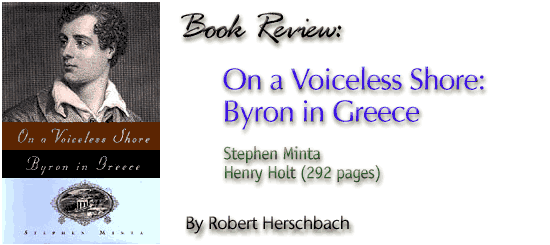 |
||
 |
||
|
In 1809, a middle class boy from Aberdeen, Scotland, set off on a grand tour of Europe. Through a genealogical quirk, George Gordon had acquired lands and a title, and was now Lord Byron. Arriving in Patras, he began a journey across Greece that was to last more than two years. In Ioannina, he met Ali Pasha, who doted on Byron, sending him daily gifts of almonds and sherbet. In Athens, Byron found himself in the middle of what, then as now, was a great controversy - the debate over Lord Elgin's seizure of the Parthenon marbles. (Byron came out firmly against Elgin). Throughout Greece, Byron indulged in the sexual escapades that made him a figure both of legend and scandal. Twelve years later, a tired-out, prematurely aged Byron returned to Greece, this time on a quest to aid the Greek War of Independence. One April afternoon, in the town of Mesolonghi, Byron went riding, was caught in a rainstorm, and developed a fever. Doctors exacerbated, rather than cured, the mysterious illness, and Byron died on April 19, 1824. He was thirty-six. In another two years, many of those he had known in Mesolonghi would perish, slaughtered in one of the war's most brutal incidents. Vivid Pictures Of A Land And People Stephen Minta, author of a widely acclaimed book on the 16th-century explorer Lope De Aguirre, has written a luminous narrative that blends biography, travelogue and memoir. Minta draws on his own Greek travels, offering vivid pictures of a land and people that have clearly fascinated him deeply. The book is as much an exploration of his own neo-Romantic sensibility as it is an account of Byron's character and motives. The story of the English poet's travels provides a framework for Minta's meditations on the relationship between freedom and duty, self-gratification and self-sacrifice, and on the nomad's need to discover a sense of necessity. "He had come to Greece pursuing no cause but his own self-satisfaction," Minta writes of Byron, though he is also describing himself. "Years later, he had returned, and with a purpose." Literary Travel Writing On A Voiceless Shore eludes categories, but comes closest in style and intention to the genre of literary travel writing pioneered by Bruce Chatwin. Minta's ability to evoke a sense of place -- he is especially artful in describing sleepy regional towns -- will delight armchair travellers as well as those who have lived or journeyed extensively in Greece and neighboring countries. He also writes with a consciousness of the links between current and past Balkan history. His unflinching accounts of 19th century atrocities provide a sobering reminder that "ethnic cleansing" is not a recent development. |
||
 |